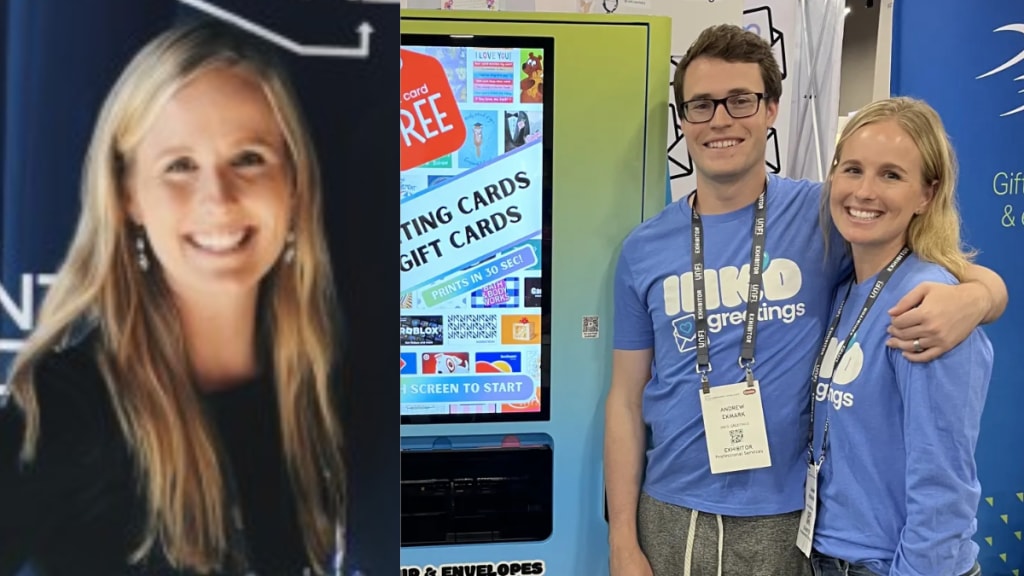Life doesn’t always move in a straight line. Sometimes it bends, swerves or forces an unexpected turn. Few know this better than Sammi Ekmark. At 29, she is the co-founder of Ink’d Greetings, a personalised greeting and gift card company she launched with her husband, Andrew, in 2023.
But this business represents a dramatic departure from the life she once imagined for herself, a future as a professional tennis star.
Her childhood was all about tennis
Ekmark’s relationship with tennis began when she was just 10 years old. The sport completely took over her days, her weekends and eventually her ambitions. By high school, she was a force, undefeated at 92-0.
“I really focused on tennis. I was 92-0 in high school, so I never lost a match,” she told CNBC. “I played every single day for two and a half hours after school,” she added, noting that this was in addition to regular matches and weekend tournaments.
By the time she reached college age, offers poured in from universities across the country. She chose Arizona State University, which awarded her a full scholarship to join its Division I team.
At the time, Ekmark was among the top 50 women’s singles players in the nation. Tennis was not just her priority, it was her identity.
One injury changed everything for her
Then came the moment that shifted her entire trajectory. During a late-night tournament in college, she misstepped, and her knee buckled. She had torn her ACL, one of the most feared injuries in sports.
“A lot of the times people do consider ACL [tears] a massive career ender,” she explained to CNBC. “When I got my injury … It made me take a year off, and it was very tough. Tennis was still my life, but it was hard to get back into it as good as before.”
Ekmark returned to the court after recovery, but something had changed. Her focus was not the same, not because she did not love the game, but because something new had captured her attention.
How did she find her new passion?
An entrepreneurship class at ASU introduced her to a world she had never considered. Bit by bit, she found herself pulled toward business ideas, creative thinking and the thrill of building something of her own.
After years of dedicating every spare moment to tennis, she made the difficult decision to pivot. Ink’d Greetings was born soon after, and today the company brings in more than $25,000 a month.
Ekmark’s story tells us the experience of thousands of young athletes across the country who devote years to pursuing sports as a profession.
Parents spend an average of $3,000 a year on youth sports, and 64% say those costs are rising, according to New York Life. However, fewer than 2% of the more than 500,000 NCAA athletes ever make it to the professional level.
The price athletes pay
“I unfortunately wasn’t as serious about academics as I would have liked to [have been] … I was there for tennis, and I know probably a lot of athletes are like that,” she said to CNBC. “So sports, if you want to [play on] a high level, are an extreme sacrifice …. The room for error is so small.”
Most college athletes must confront the same reality. After graduation, they enter the world with remarkable discipline and resilience, but little traditional work experience. Ekmark believes that athletes are uniquely wired for the entrepreneurial world. “I think the best entrepreneurs are going to be people who were former athletes,” she told CNBC.
For Ekmark, entrepreneurship was not just a backup plan; it became her next great pursuit. And she wants younger athletes to have access to that mindset early.
“I think that we need to start giving athletes another route … and we need to start instilling it in their minds earlier than when they fail and when they can’t go pro,” she exp,ained to CNBC. “I think it does need to be in college like what [some schools] are doing now. And I think that entrepreneurship is probably the best route,” she told CNBC.
Her journey began with a dream of tennis glory. It ended with the creation of a successful business and the realisation that purpose does not disappear when one path closes. It simply redirects.

